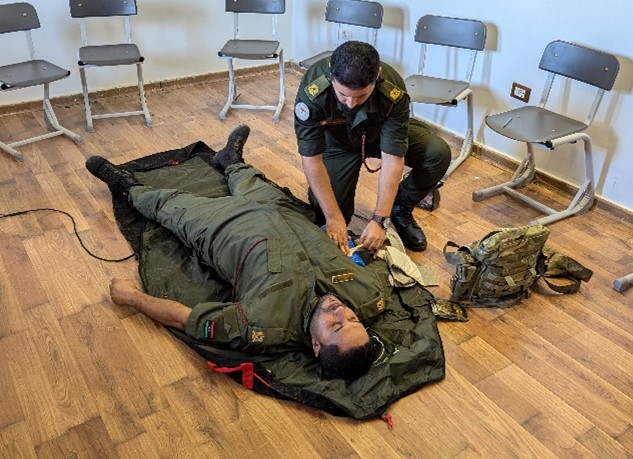
Libyan Medical Corps course delegates taking part in simulation assessment
Bringing Life-Saving Skills to Libya
by Cpl Banfield, RMR Bristol
Introduction
In a region often overshadowed by conflict, as a small group of Royal Marine Reservists and an Army Lieutenant Colonel from 16 Medical Regiment we recently made a significant impact in Libya. A week-long mission in the form of a medical short term training team (STTT) to the British Embassy, led by WO2 Cooper, focused on training both civilian and military medics in military medical first aid and prolonged field care techniques. This was the first STTT to Libya in over 10 years.
The Mission
The initiative, spearheaded by Colonel Matt Ketterer, his support staff, and a team of experienced medics, aimed to equip Libyan medical personnel with the skills necessary to save lives in challenging battlefield conditions. The planning phase of this mission was not straight forward due to this being the first STTT in a long while. The team remained flexible at all times and responded positively to requests for information that at times appeared to be never-ending. Once all the admin was squared away and the green light was given, myself, Sgt Harding, WO2 Cooper and Lt Col Hazlerigg made our way to the airport and were Tripoli bound.
The training sessions, held at a villa in Tripoli under the watchful eye of the Defence Attaché and the Director General Libyan Medical Corps, covered a wide range of topics, including:
- Military Medical Training: This comprehensive approach to battlefield medicine prioritises immediate life-saving interventions, such as controlling bleeding and airway management.
- Prolonged Field Care (PFC): This focuses on providing care to casualties in remote or austere environments, often for extended periods.
A Successful Partnership
The collaboration between us as a mostly RMR Bristol short term training team (STTT) and 30 Libyan medics from across 25 medical facilities in Libya proved to be highly successful. The Libyan participants were enthusiastic and eager to learn, demonstrating a strong commitment to improving their medical capabilities. The training sessions were interactive and hands-on, allowing participants to practice the techniques under simulated conditions.
The Impact
The impact of this mission extends beyond the immediate training. By equipping Libyan medics with advanced medical skills, we have contributed to enhancing the country’s healthcare infrastructure and its ability to respond to emergencies. This investment in human resource will undoubtedly save lives and improve the overall health and well-being of the Libyan people.
Highlights
A personal highlight of the deployment for me was being accommodated in same villa as the UK Ambassador to Libya and taking a much needed dip in the oggin after a hard day’s work by making the most of his outdoor swimming pool facility.
Forward Look
The STTT was evaluated as hugely beneficial by our Libyan counterparts with almost immediate requests for future packages to be delivered in 2025.
Conclusion
We were hosted superbly by the Defence Attaché and his team, supplied with excellent accommodation facilities, a top notch gymnasium and unbelievably good scran which was hard to resist a double tap.
The week-long mission to Libya was a testament to the power of cooperation between medics from UK and Libya in working together to save lives.







